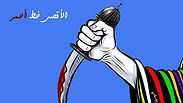
Knesset to consider law cracking down on internet incitement
Justice Minister Shaked and Public Security Minister Erdan seek to codify legislation allowing removal of threatening content from social media sites within hours; Authors say it won't infringe on freedom of speech.
Draft legislation is currently being prepared by Justice Minister Ayelet Shaked, Public Security Minister Gilad Erdan and the Deputy Attorney General Raz Nazari, which will enable authorities to expedite the process of removing content defined as terror-related.
In order to facilitate swift removal of such content, an administrative court order may be required to. Only thereafter would authorities need to proceed with a criminal investigation against a suspect - a process which usually takes time to execute.
Today, when security services or the National Cyber Association discover content which constitutes incitement to commit acts of terror published by way of a social media post or an internet article, an appeal is usually made to the networks such as Facebook for the removal which, in most cases, is enforced.
However, given the protracted nature of the process, efforts are often rendered futile. Formulators of the new legislation therefore are seeking to circumvent this delaying obstacles by granting authorities to immediately remove incitement material by taking the appeal to the state attorney, or to an individual acting on his behalf, who will then consider whether the the content constitutes an assault against state security, against public security or against individual security.
Moreover, it will also examine whether the content exceeds the limits of freedom of expression. If it is decided to remove the content, the district courts will immediately be notified and the content will be removed in a matter of hours.
Noting the potential threat the proposed law poses to freedom of speech, the Ministry of Justice clarified that content-removal decrees will be issued sparingly, only in extreme cases and will be directed solely against threatening content.
As part of the struggle against terror organizations, an amendment will also be made to the existing legislation on the issue, which currently grants the authority to close places used for crimes such as pedophilia, gambling and drugs. Terror will also be added to theses categories.
Consequently, authorities will have the power to close down virtual sites and networks used for criminal purposes. Moreover, they will be authorized to disable websites that recruit terrorists, remove their content and calls to terror and document the actions of its moderators and users. Israel would not be the first to pass such legislation with similar laws already existing in other countries such as Australia and France.
Two weeks ago, Ministers Shaked and Erdan instructed the head of the State Attorney's Cyber Office, Dr. Haim Wismonski and police cyber units to coordinate the removal of harmful material such as expressions of support for terror, shaming and defaming public officials.
In cases in which illicit posts are uploaded, the justice ministry will approach the various social networks and internet sites such as Facebook and Google and inform them that the content violates the provisions stipulated in the Israeli Penal Code and is therefore a violation of the terms of use.
Israeli security officials have clashed with Facebook in recent days over what Israel views as a cavalier attitude in addressing the problem of incitment posted on its webiste.













